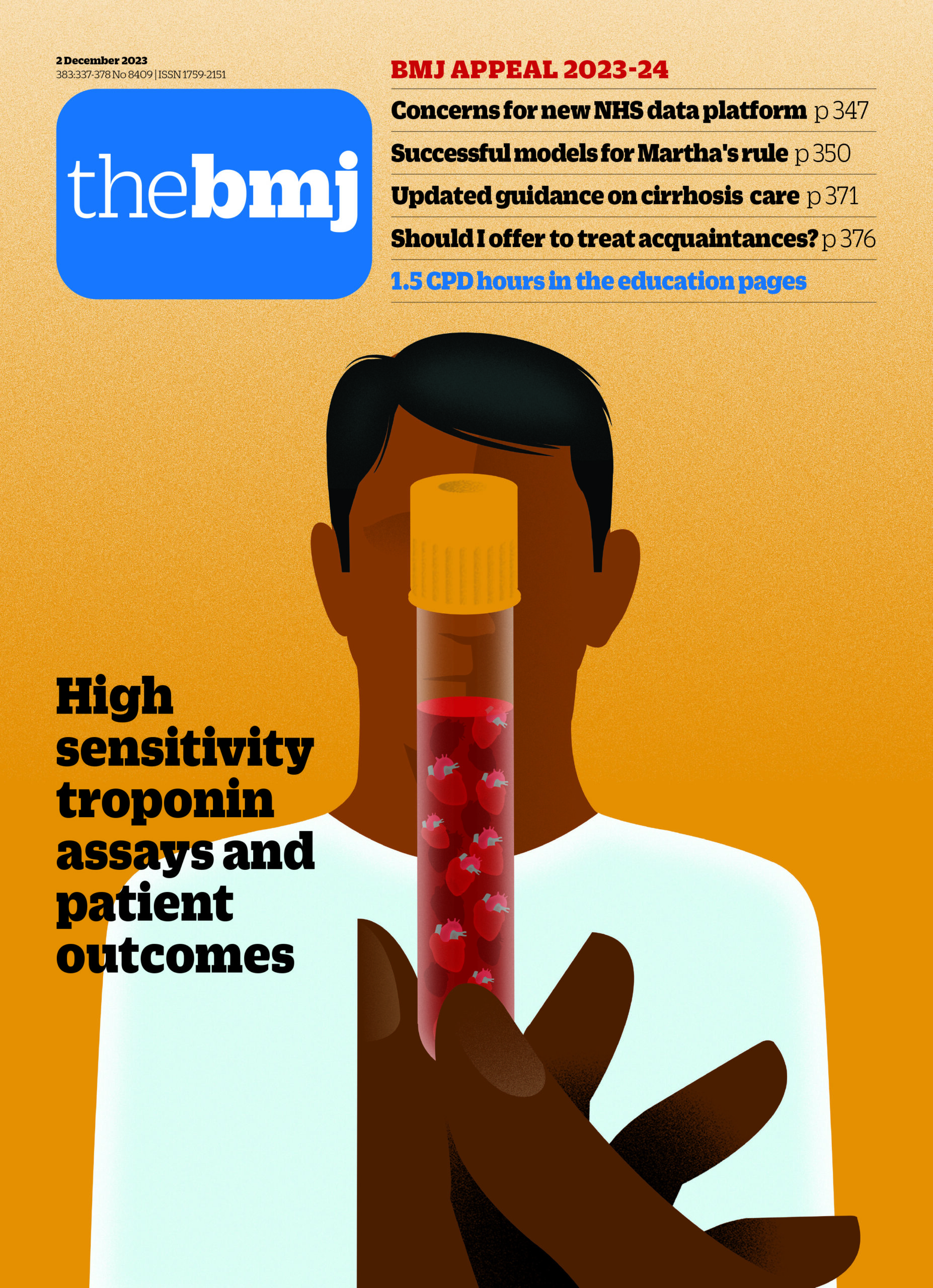
- Rajat Khosla, director1,
- Katri Bertram, senior global health consultant2
- 1United Nations University International Institute on Global Health
- 2Partners for Impact
- Twitter: @khosla_rajat
Bluesky: @katribertram.bsky.social
“If access to healthcare is considered a human right, who is considered human enough to have that right?”—Paul Farmer, medical anthropologist and physician
For global health, 2023 has been a particularly challenging year. Armed conflicts and authoritarian nationalist leadership are on the rise, fiscal space and budgets for health are shrinking, and health related climate risks are growing.1 Political leaders’ responses to opportunities posed by three health related UN high level meetings on pandemics, universal health coverage, and tuberculosis in September, as well as ongoing negotiations on the pandemic accord, haven’t yet produced tangible action. In the worst cases they’ve reinforced nationalist rhetoric and negotiation positions, whereby self-interest and greed among countries and private stakeholders have trumped our shared humanity.
As we approach the 75th anniversary of the landmark Universal Declaration of Human Rights (ratified on 10 December 1948), whereby countries committed to ensuring that “all human beings are born free and equal in dignity and rights,”2 we seem to have departed from the principles of the declaration and the narrative of human rights in health. We must reflect on lessons from 2023 and call for courage from the entire global health community to reclaim the civic space and the rights based narrative that define global health. This is critical to achieving our ultimate goal: the right to health for everyone, everywhere.
Dwindling narrative
Human rights advocates have repeatedly expressed concerns this year about drafts of the pandemic accord, arguing that the right to health and equity is being systematically weakened or removed.3 While the most recent draft has included some language on intellectual property waivers and TRIPS (exclusive patent) flexibilities for all pandemic related products, it remains a far cry from reaffirming a human rights based approach to health that would ensure non-discriminatory and equitable access to all necessary products.4
Such systematic exclusion of human rights was also evident in the recently adopted United Nations political declarations on pandemics, universal health coverage, and tuberculosis, which were criticised because they offered “no advancement on previous international agreements” and were “devoid of human rights safeguards.”5
Even when health is acknowledged as a human right it often gets reduced to preambular reaffirmations, and few if any concrete operational commitments are made.6 More worryingly, in opposition to the spirit of the declaration, this year we’ve seen an increase of dehumanising rhetoric and denial of the human right to health, as seen in the cases of refugees, migrants, or people caught up in war.
Eroding spaces
Many countries used the covid pandemic to further restrict civic space, including clamping down on non-governmental organisations and the freedom to associate or demonstrate. Shrinking civic space was already a global trend before the pandemic,7 and it has continued since.8 In parallel we’ve witnessed increasing influence of powerful private actors, including the drug industry, private consulting firms, and “philanthrocapitalist” organisations. These actors have contributed to the ongoing blocking of language on intellectual property waivers and technology transfer in the pandemic accord, the fossil fuel industry continuing to dominate negotiations affecting climate and health, and further movement away from social security and solidarity based systems.91011 As power, funding, and access to products and services become more concentrated, the human right to health has become a distant dream for ever more people.
Most worryingly in 2023, we’ve seen shrinking political space for civil society and activists to dissent and protest violations of health and human rights. In many countries and regions the funding of non-governmental organisations is restricted, and surveillance of rights based activists resulting in repression and criminalisation of any dissent has become an increasingly tolerated norm.12
Reclaiming the narrative, defending civic space
Despite the bleak current state of the world, the global health community has the strength and position to defend the human right to health. We can learn from the HIV epidemic, where sexual and reproductive health advocates and health workers have, against all odds, defended the rights of populations and delivered access to health.13 To reclaim health as a human right we must take inspiration from the 18th century activists who fought for freedom and liberty for all.
To deliver and progress on our commitment to the right to health for all, we call for courage from the global health community to stand up for the human rights of everyone, everywhere, and not just when it affects us or our own interests. To do this we must urgently foster a collective voice and demand that health continues to be recognised as a legally binding human right—and that these rights are universal, for all people in all situations. We must speak out, loudly and firmly, on violations of health and human rights. It’s also essential to defend and actively support a safe, independent civic space for activists and communities to engage in advocacy and call for accountability.
Human rights are not a panacea: they provide no silver bullets for the complexity of challenges we confront in global health and beyond. But reaffirming our “faith in fundamental human rights, in the dignity and worth of the human person and in [their] equal rights”2 provides strong foundations for rebuilding our vision of health and human rights, to tackle not only our present challenges but also future ones.
